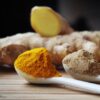What is it really doing to our bodies? Is it really that bad? How much is too much?
Sucrose, from cane sugar is the preferred choice for Australian food manufacturers. Sucrose is made from combining glucose and fructose – as occurs in nearly every other popular sweeteners, this includes honey, molasses, coconut sugar, agave syrup, dates and fruit juice concentrates. It is important to know that these sweeteners contribute to the total glucose/fructose intake.
Although glucose and fructose are both sugars, our bodies metabolise them differently. Glucose is largely released into the bloodstream for distribution to peripheral tissues, this gives glucose a greater impact on blood glucose and insulin levels. Fructose differs as it is sequestered to the liver and converted into glucose and lactic acid for hepatic or peripheral distribution, it is also converted to fatty acids and glycerols for triglyceride synthesis.
What are these sugars doing to our bodies? A 50g dose of fructose or glucose have different effects on our blood glucose, insulin, and triglyceride levels. Glucose significantly raises blood glucose levels, whereas fructose has little effect. Glucose also significantly raises blood insulin levels and again fructose had little effect. A 50g dose of fructose raises blood triglyceride levels dramatically whereas this time glucose has little effect.
So what does this all mean? If you are continually consuming very high doses of fructose (100-200g/daily), you will promote the effects of metabolic syndrome through chronic and excessive elevation of hepatic and blood fats. Your body will have impaired insulin sensitivity and create fatty liver and dyslipidemia. Interestingly, the higher insulin stimulation seen with glucose ingestion may mean it is easier to gain weight with glucose. So it seems that at high intake levels both fructose and glucose have adverse effects, but keeping consumption of these sugars low (<50g/day) will have little to no effects.
Metabolic signs that you are consuming too much sugar may include elevated blood glucose, insulin, triglycerides, total and LDL cholesterol, as well as hypertension and weight gain.
So how much is too much? Currently the western countries daily intake is around 100g/day, four times the recommended level set by the World Health Organisation in 2015 of about 25g of added sugar. Added sugar does not include whole fruits, as sugar in fruit does not have the same detrimental metabolic effects as refined sugar. This is because the intact cell wall structure in whole fruits provides an ‘encapsulation effect’ to slowly release sugars into the intestine, this is important to remember as simply retaining the fibre by blending does not retain all the benefits of whole fruit consumption.
How do you combat cravings for sweets? Evolutionarily, it has been proposed that the sweet taste was so rare and so highly prized, that we developed a strong reward system for sweet tastes. Studies have shown that sugar is more addictive than cocaine, furthermore when sugar is combined with fat, an even higher ‘hedonic point’ in the reward centre is reached which stimulates overconsumption and cravings and this is something that the food industry has perfected. So with the odds stacked against us already, cutting down on sweets is definitely difficult. Out of sight out of mind – science has shown the less visible and further away sweets are, the less consumption occurs. Try buying smaller portions of treats as our reward centre will not just stop at one, it will stop when the pack is gone. Set up a good habit after eating sugar – go for a walk, send the kids outside, or any kind of movement.
What else do you need to know? High levels of fructose and glucose can promote cancer growth. If you suffer with IBS consuming high levels of sugar can aggravate symptoms. By simply preparing home cooked meals you are significantly reducing exposure to added sugars. Read the food labels of processed foods, if they are high in sugar look at a different brand or a different alternative.
Just remember that sugars are a natural part of the diet. Eat them as such, as whole foods and in the least refined versions as possible.





